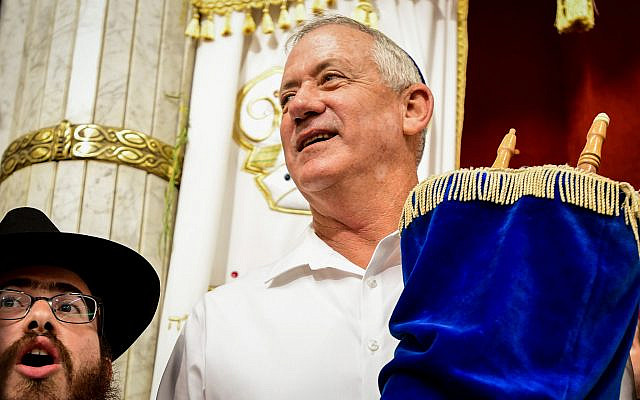PM’s rivals rejoice over his second consecutive failure to build government, though Gantz’s own chances of doing so appear slim

The Blue and White party and other political opponents of Prime Minister Benjamin Netanyahu on Monday rejoiced over the Likud leader’s inability to form a government, and President Reuven Rivlin’s announcement he would give Benny Gantz the next crack at assembling a coalition.
Netanyahu announced Monday he would return the mandate to Rivlin ahead of Wednesday’s deadline to put together a government, blaming his failure to do so on Gantz, his Blue and White deputy Yair Lapid and Yisrael Beytenu party leader Avigdor Liberman.
“The time for spin is over,” Gantz’s party said in a statement. “Blue and White is determined to form the liberal unity government, headed by Gantz, that the nation chose a month ago.”
It was the second consecutive time Netanyahu was unable to build a majority. Following elections in April, Netanyahu was one seat short of a majority and pushed through a vote to dissolve the Knesset and call a snap vote rather than have another lawmaker be tasked with forming a government.
“Bibi [Netanyahu] again fails,” Lapid taunted on Twitter.

There was no immediate reaction from Liberman, whose refusal to join a Netanyahu led-government after the April vote helped trigger last month’s elections.
Liberman’s Yisrael Beytenu party now holds the balance of power in the Knesset, with neither Netanyahu nor Gantz having any clear path to a government without its 8 seats.
Netanyahu in recent days has accused Blue and White of seeking to establish a minority government with outside backing from Liberman and the Joint List of majority Arab parties, a claim he repeated in a video statement Monday evening.
Gantz, Liberman and the Joint List have all denied this.
“The magician long ago ran out of tricks and he’s pulling out the incitement card. I hope this will be the last time that Netanyahu incites against the Arab citizens as prime minister,” Joint List chairman Ayman Odeh said in response.
Ten of the Joint List’s 13 lawmakers recommended Gantz form the next government after the elections, but the party indicated at the time it would not sit in a coalition helmed by Blue and White.

Labor-Gesher party leader Amir Peretz declared that Netanyahu’s repeat failure to muster a majority marked the end of the Likud leader’s time in the Prime Minister’s Office.
“This evening Netanyahu finished his role as prime minister and his failure is actually the new hope of Israeli citizens,” Peretz wrote on Twitter.
Peretz, who after the September 17 elections backed Gantz for prime minister, called for the establishment of a government that would focus on “dealing with increasing violence,” cost-of-living issues and “patching up the rifts Netanyahu has created in the last decade.”
Nitzan Horowitz, head of the left-wing Democratic Camp alliance, congratulated Gantz on being tasked with forming a government and said he hoped to join a coalition headed by the Blue and White chief.

“A government of change, that will stop the incitement and the racism, strive for peace and advance social justice. The time has arrived,” he tweeted.
Gantz now has 28 days to try and do what Netanyahu could not. If he fails, any MK will have 21 days to obtain the support of a Knesset majority to form a government. If no one succeeds, elections will be initiated automatically — a third round inside a year after April’s and September’s inconclusive votes.
Netanyahu was initially tasked by Rivlin with trying to form a government based on the strength of his pact with right-wing and ultra-Orthodox parties to negotiate as a bloc of 55 MKs after September 17’s inconclusive elections (Likud: 32; Shas: 9; United Torah Judaism: 7 and Yamina 7). Gantz heads a bloc of 54 MKs from the center, left and Arab parties (Blue and White: 33; Labor-Gesher: 6; Democratic Camp 5; and 10 MKs from the mainly Arab Joint List). But the 10 Arab MKs in that group would not join a Gantz-led coalition. (Three other MKs from the Joint List did not back either candidate.)
Liberman is not in either bloc and has called for a secular unity government comprising Likud, Blue and White and his own party. But Netanyahu has refused to abandon his ultra-Orthodox partners Shas and United Torah Judaism. And Gantz has hitherto refused to partner Likud so long as Netanyahu is facing possible indictment in three corruption cases.

Rivlin has suggested a unity government in which power would be equally divided and Netanyahu and Gantz would each serve two years as prime minister. Rivlin implied, but did not specify, that Netanyahu would take an open-ended leave of absence if or when he is indicted in one or more of the three criminal probes in which he faces charges. Under the arrangement set out by Rivlin, Gantz, as “interim prime minister” in such a scenario, would enjoy all prime ministerial authority.
But the two parties have been unable to agree, among other matters, on who would be prime minister first under such an arrangement.
Prosecution officials said last week that they hoped to reach a final decision on whether to indict the premier by the end of the year, and possibly by next month.
As reported by The Times of Israel
